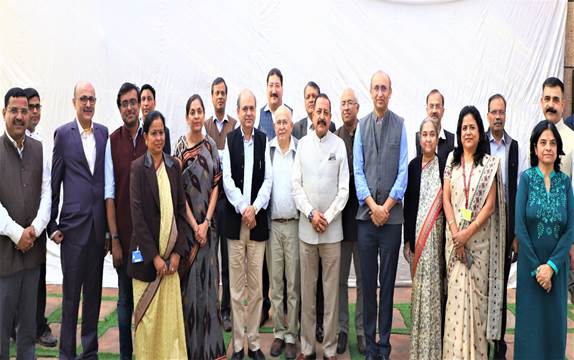New Delhi : World’s first intra-nasal vaccine for COVID developed by India has got approval from the Central Drugs Standard Control Organisation (CDSCO) for restricted use in emergency situations in the age group of 18 and above.
This was stated here today by Union Minister of State (Independent Charge) Science & Technology; Minister of State (Independent Charge) Earth Sciences; MoS PMO, Personnel, Public Grievances, Pensions, Atomic Energy and Space, Dr Jitendra Singh while chairing the meeting of the Societies of Autonomous Institutions of Department of Biotechnology where he also informed about the historic decision to merge the 14 societies of Biotechnology Institutes into a single society in the interest of convenient functioning, cost-effectiveness and integrated working.
The Minister lauded the role of the Department of Biotechnology (DBT) and its PSU, Biotechnology Industry Research Assistance (BIRAC) for supporting the development of world’s first Intranasal vaccine for COVID by Bharat Biotech International Limited (BBIL).
Dr Jitendra Singh informed that the Product development and Clinical trials were funded by the Department of biotechnology, Government of India and BIRAC under the Mission COVID Suraksha Program. This vaccine received approval under restricted Use in emergency situations for ages 18 and above for primary 2 dose schedule, homologous booster doses.
Dr Jitendra Singh said, India’s efforts through Mission COVID Suraksha under the dynamic leadership of Prime Minister Narendra Modi has not only strengthened AtmaNirbhar Bharat but also bolstered India’s status as a worldwide vaccine development and manufacturing center showcasing the strength of Science and Technology. It is a matter of great pride for the country, the Minister added.
Phase-III trials were conducted for safety, and immunogenicity in ~3100 subjects, in 14 trial sites across India (supported by BIRAC). Heterologous booster dose studies were conducted for safety and immunogenicity in ~875 subjects, where a booster dose (3rd dose) of BBV154 intranasal vaccine was administered to study participants who were previously vaccinated with licensed COVID vaccines. The clinical trials were conducted in 9 trial sites across India. National Institute of Immunology (NII), an autonomous institute of DBT in New Delhi utilized their “Human Immune Monitoring and T-cell Immunoassay Platform” to examine the vaccine-induced SARS-CoV-2-specific systemic and mucosal cellular immune responses the trial participants. Interactive Research School for Health Affairs (IRSHA), Pune (supported by BIRAC) completed the “Plaque Reduction Neutralization Assay” (PRNT) to quantify the titer of neutralizing antibody for the virus from three trial sites.
This vaccine has the double benefit of enabling faster development of variant-specific vaccines and easy nasal delivery that enables mass immunization to protect from emerging variants of concern. It promises to become an important tool in mass vaccinations during pandemics and endemics.
Vaccine is a recombinant replication deficient adenovirus vectored vaccine with a pre-fusion stabilized spike protein. This vaccine candidate was evaluated in Phases I, II and III clinical trials with successful results. It has been specifically formulated to allow intranasal delivery through nasal drops. The nasal delivery system has been designed and developed to be cost-effective in low- and middle-income countries. This vaccine is stable at 2-8°C for easy storage and distribution. Large manufacturing capabilities have been established by Bharat Biotech at multiple sites across India, including Gujarat, Karnataka, Maharashtra, and Telangana, with operations pan India.

In another historic and path-breaking decision, Dr Jitendra Singh today approved subsuming of 14 Autonomous Institutions of DBT to create one Apex Autonomous Body – Biotechnology Research and Innovation Council (BRIC) for achieving centralized and unified governance to maximize impact of biotech research.
Dr Jitendra Singh the move is a tribute to Prime Minister Modi’s vision of “Minimum Government, Maximum Governance” as well as his call for Greater Integration of Ideas and Institutions for cost-cutting and effective output.
Dr Jitendra Singh explained that the restructuring of DBT institutes is being carried out with a larger goal to enhance the scientific character and science outcomes at the institutes by building research synergies, new education programs in line with National Education Policy, improving human resource structures across cadres and effective management and monetization of assets emanating from the research being carried out.
The Minister hoped that BRIC will build on the foundations developed at the DBT institutions to foster synergies while maintaining their distinct research mandates. With an emphasis on interdisciplinary interactions that cut across institutional boundaries, BRIC institutes will undertake cutting edge research addressing national priorities, the Minister added.

Secretary, DBT, Rajesh Gokhale earlier welcomed the Minister and oversaw the presentation of Science activities in 2021-2022 by 9 Institutes today, while remaining 5 will give their presentations tomorrow.

Comments are closed.